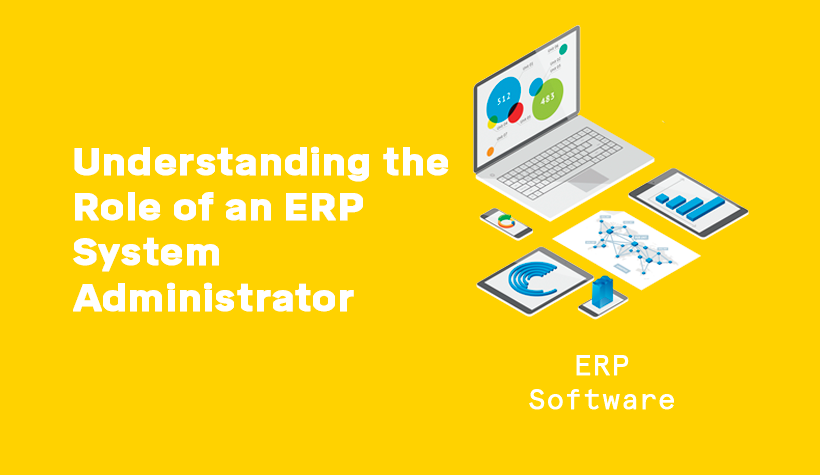Lumenia Guest Post from Fiona McGuinness, Marketing Officer at Intact
In the world of ERP implementation, ensuring the success of your project requires more than just the efforts of your ERP provider. While they offer valuable guidance and direction, your organisation also plays a crucial role in the process. One essential role to consider is that of the ERP System Administrator. In this article, we’ll delve into the responsibilities and significance of this role in ERP implementation and the on-going optimisation of your software.
The Role of an ERP System Administrator:
Implementing an ERP system can introduce significant changes and uncertainties within your organisation. Employees may have concerns about how their daily processes will be affected and the time it will take to adapt to the new technology. Your ERP System Administrator is a key figure in easing these concerns and managing the entire implementation process.

Key Responsibilities of an ERP System Administrator:
- In-depth System Knowledge: Your ERP System Administrator must possess a deep understanding of your new system, including its various components. They will be fully trained so they can manage your data, modify user interfaces, and configuring your system according to your business rules and policies.
- Workflow Management: They are responsible for configuring your company workflows and continually improving them as your organisation grows and scales.
- Data Security: Administering security policies is a crucial aspect of the role, ensuring that sensitive information is accessible only to authorised personnel.
- Data Extraction and Validation: While your ERP vendor can assist with data extraction, the System Administrator plays a vital role in validating the data and ensuring its accuracy. This process often requires collaboration across different departments.
Skills Required for an ERP System Administrator:
- Technical Proficiency: The role demands a strong technical background, including proficiency with Microsoft Server and various programming technologies. Staying updated on ERP system developments is also essential.
- Communication Skills: Effective communication, both verbal and written, is crucial. The Administrator must translate technical information into clear, understandable terms for all stakeholders.
- Documentation: They should be skilled in producing comprehensive and comprehensible documentation of processes and technical specifications.
Why an ERP System Administrator Matters:
- Smooth Implementation & ongoing success: An ERP System Administrator is vital for a successful implementation and ongoing success of your system. They identify areas for improvement, respond to staff needs, meet customer demands and assign ERP ownership within the organisation.
- Team Collaboration: They ensure that ERP system users understand how their roles relate to other teams and departments, promoting collaboration and breaking down silos.
- Your In-house Business Expert: Your ERP system administrator will fully comprehend the operations of all business units, essentially serving as your in-house business expert. They will be proficient in data reporting, adept at gathering pertinent information, and skilled at presenting it to your chosen vendor.
- Proactive Relationship with Vendors: A skilled Administrator can maintain a proactive relationship with your ERP vendor, preventing conflicts by fostering a deep understanding of the system and processes.
Other Essential Roles in ERP Implementation:
Apart from the ERP System Administrator, other critical roles include:
- Project Sponsor: Responsible for project budget and timescale decisions.
- Project Manager: Oversees project activities and customer responsibilities.
- Data Extraction & Manipulation Lead: Manages the extraction and manipulation of data from legacy systems.
- Workstream/Process Leads: Responsible for designing processes and structures within sales, purchasing, stock, and sales finance teams.
Conclusion:
An ERP System Administrator is a key player in ensuring the success of your ERP implementation and the long-term success of your software solution. Their role encompasses technical expertise, effective communication, and collaboration with various teams.
It’s a big role that can’t be underestimated. It’s vital that your System Administrator understands what they are getting in to, and that they are given the time to do it.
This person isn’t just a tech expert but also a key navigator during your ERP implementation journey. By giving them the support they require, they can ensure a smoother transition to your new ERP system and set the stage for ongoing improvement and growth. They are the bridge between technology and your business, making sure your ERP system’s potential is fully realised.
For deeper insights into the system administrator’s responsibilities, click here to explore the full article available on Intact’s website.
Intact is delighted to once again, participate in this year’s ERP HEADtoHEAD event. It offers attendees such a unique opportunity to explore and evaluate leading ERP system vendors and their products. Each year, we eagerly anticipate this event as it allows us to showcase our software’s latest capabilities, highlight its strengths, and engage with attendees to understand their business needs better.
We can’t wait for our team to meet you at the ERP HEADtoHEAD and demonstrate how our software can really simplify your operations. Find out more about Intact at the event.



